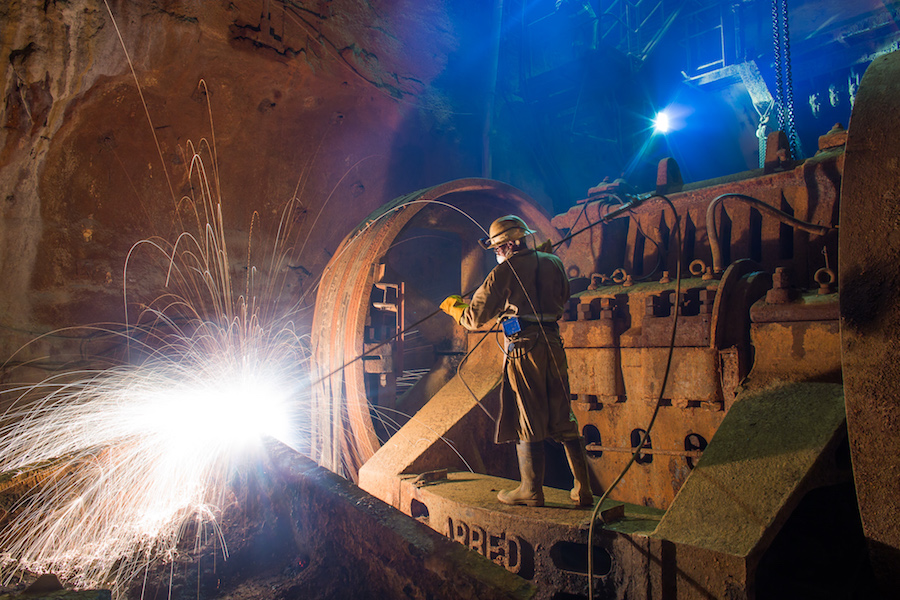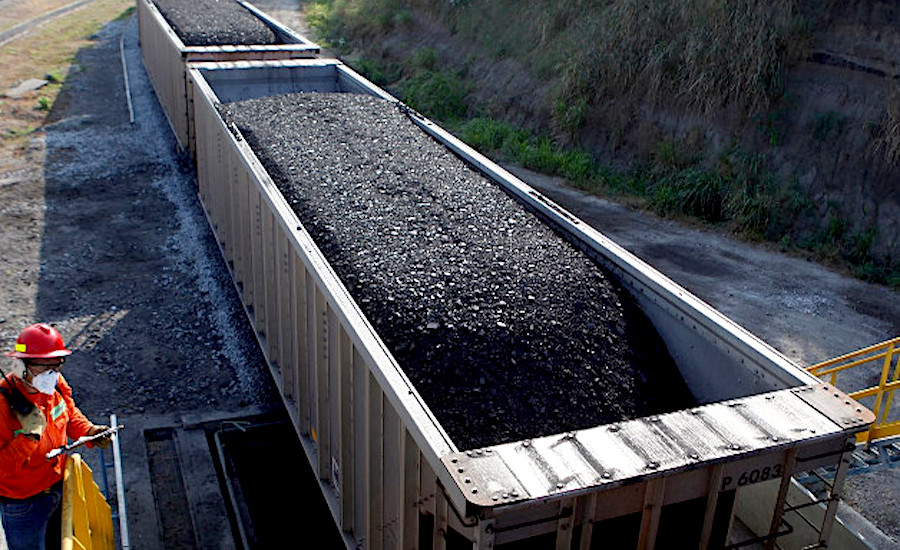Bloomberg News | June 26, 2024 |

The Kipushi zinc-copper-silver-germanium project in DRC.
(Image courtesy of Ivanhoe Mines.)
Production from a large new zinc mine in the Democratic Republic of Congo will be split between several new buyers including trading giant Trafigura Group, after rival Glencore Plc backed away from a previous deal for the entire supply.

Ivanhoe Mines Ltd.’s Kipushi zinc mine started production in the past few days and is finalizing deals to sell its zinc to Trafigura, China’s Citic and Boliden AB, according to people familiar with the matter, who asked not to be identified as the matter isn’t public.
Kipushi is set to be one of the world’s largest zinc mines, with output planned at more than 250,000 tons per year, and will produce a semi-processed form of ore known as concentrate that is currently in tight supply.
Ivanhoe, Gécamines to reopen historic Kipushi mine
For Trafigura, the deal will help cement its position in the zinc concentrates market, with neither of its major competitors Glencore or IXM getting a share of the offtake. Glencore, long a dominant player in the zinc market, has recently been making changes at the top of its zinc unit and taking steps to exit certain investments.
The market for zinc concentrates has been extremely tight, with processing fees paid by miners to smelters plunging as mine supply disappoints and smelters in Europe reopen in the wake of the 2021-2022 energy crisis. On the spot market, the so-called treatment charges have fallen to just $5 a ton, the lowest since at least 2014, according to Fastmarkets, while annually agreed “benchmark” treatment charges dropped 40% this year.
Production from a large new zinc mine in the Democratic Republic of Congo will be split between several new buyers including trading giant Trafigura Group, after rival Glencore Plc backed away from a previous deal for the entire supply.

Ivanhoe Mines Ltd.’s Kipushi zinc mine started production in the past few days and is finalizing deals to sell its zinc to Trafigura, China’s Citic and Boliden AB, according to people familiar with the matter, who asked not to be identified as the matter isn’t public.
Kipushi is set to be one of the world’s largest zinc mines, with output planned at more than 250,000 tons per year, and will produce a semi-processed form of ore known as concentrate that is currently in tight supply.
Ivanhoe, Gécamines to reopen historic Kipushi mine
For Trafigura, the deal will help cement its position in the zinc concentrates market, with neither of its major competitors Glencore or IXM getting a share of the offtake. Glencore, long a dominant player in the zinc market, has recently been making changes at the top of its zinc unit and taking steps to exit certain investments.
The market for zinc concentrates has been extremely tight, with processing fees paid by miners to smelters plunging as mine supply disappoints and smelters in Europe reopen in the wake of the 2021-2022 energy crisis. On the spot market, the so-called treatment charges have fallen to just $5 a ton, the lowest since at least 2014, according to Fastmarkets, while annually agreed “benchmark” treatment charges dropped 40% this year.
Glencore deal
Ivanhoe last year announced that it had signed a term sheet to sell the entire zinc output of the Kipushi mine to Glencore in exchange for a $250 million financing facility.
But since then, Glencore has pulled back from that deal, the people said, amid several senior changes in its zinc department. Nick Popovic, the co-head of zinc and copper trading who was pictured at the signing ceremony for the Kipushi term sheet, retired from the company a few months later.
Ivanhoe taps Glencore for $250 million to start Kipushi zinc mine ahead of schedule
Meanwhile IXM, the metals trader owned by China’s CMOC Group Ltd., had been in advanced negotiations for a share of the offtake from Kipushi but failed to agree a loan deal in time, the people said. IXM’s head of lead and zinc, Xavier-Alexandre Ortiz, left the company last week, with a spokesperson saying that “ambitions for the business differed.”
Ivanhoe declined to comment. The miner had previously said that it had received “significant additional interest” from potential buyers of Kipushi concentrate since agreeing the term sheet with Glencore, and that it was in negotiations with numerous parties for deals that would include financing of “$200 million or higher.”
While the contracts are being finalized, it’s still possible they may not all result in deals.
Spokespeople for Citic Metal, which owns a 24% stake in Ivanhoe, and Trafigura declined to comment. Boliden, which owns zinc smelters in Finland and Norway, said on Tuesday it does not comment on ongoing contract negotiations and had not signed a contract for supply from Kipushi. Glencore and IXM also declined to comment.
Glencore’s failure to go ahead with the deal it had agreed last year comes amid wider changes in its zinc unit — a market where it once dominated, boasting a more than 50% share of the “addressable” market for zinc metal and concentrates in its 2011 IPO prospectus.
In addition to Popovic’s retirement, Glencore earlier this year named a new head of its lead and zinc assets, Suresh Vadnagra, replacing the previous co-heads Denis Hamel and Aline Coté. The company also recently sold its controlling stake in Peruvian zinc miner Volcan Cia Minera SAA.
(By Jack Farchy and Michael J. Kavanagh)
Legal & General unit to sell Glencore stake over thermal coal plans
Reuters | June 26, 2024 |

Image courtesy of Glencore.
Legal & General’s investment management unit said on Wednesday that it is selling its stake in global commodities trader Glencore this year on concerns over its production of thermal coal.

Legal & General Investment Management (LGIM) is also selling its stake in New York-listed retailer TJX, it said, raising the number of divestments under its Climate Impact Pledge to 16, applying across funds covering around 176 billion pounds ($223 billion) in assets under management.
“While divestment is one of the many stewardship tools we use as a mechanism for driving change, we see it as a last resort and by no means the last stage of engagement,” Stephen Beer, LGIM senior manager for sustainability and responsible investment, said.
LGIM said that its decision on Glencore followed a shareholder resolution last year, requesting the miner to disclose how its thermal coal production aligns with the Paris Agreement’s objective to limit the global temperature increase to 1.5 degrees Celsius.
UK-based LGIM has a 0.44% stake in Glencore, according to LSEG data.
“We remain concerned that Glencore does not meet our red line asking mining companies to disclose whether they plan to increase thermal coal capacity,” LGIM said.
Glencore declined to comment on the news, while TJX did not immediately respond to a request for comment.
Environmental, social and governance (ESG) investing boomed in 2020 and 2021 during the Covid-19 pandemic as low oil prices spurred more investors to diversify beyond fossil fuels, and as fund managers sought to be more climate-conscious.
Through its Climate Impact Pledge, LGIM assesses over 5,000 companies across 20 ‘climate-critical’ sectors. It has also highlighted concerns about climate risk management with Woodside Energy and Nippon Steel in the past.
Glencore mines and trades thermal coal, which is a major contributor to greenhouse gas emissions. The company also has coking coal assets.
It plans to run down its thermal coal mines by the mid-2040s, closing at least 12 by 2035.
($1 = 0.7907 pounds)
(By Echha Jain and Yadarisa Shabong; Editing by Savio D’Souza, Sonia Cheema and Emelia Sithole-Matarise)
Reuters | June 26, 2024 |

Image courtesy of Glencore.
Legal & General’s investment management unit said on Wednesday that it is selling its stake in global commodities trader Glencore this year on concerns over its production of thermal coal.

Legal & General Investment Management (LGIM) is also selling its stake in New York-listed retailer TJX, it said, raising the number of divestments under its Climate Impact Pledge to 16, applying across funds covering around 176 billion pounds ($223 billion) in assets under management.
“While divestment is one of the many stewardship tools we use as a mechanism for driving change, we see it as a last resort and by no means the last stage of engagement,” Stephen Beer, LGIM senior manager for sustainability and responsible investment, said.
LGIM said that its decision on Glencore followed a shareholder resolution last year, requesting the miner to disclose how its thermal coal production aligns with the Paris Agreement’s objective to limit the global temperature increase to 1.5 degrees Celsius.
UK-based LGIM has a 0.44% stake in Glencore, according to LSEG data.
“We remain concerned that Glencore does not meet our red line asking mining companies to disclose whether they plan to increase thermal coal capacity,” LGIM said.
Glencore declined to comment on the news, while TJX did not immediately respond to a request for comment.
Environmental, social and governance (ESG) investing boomed in 2020 and 2021 during the Covid-19 pandemic as low oil prices spurred more investors to diversify beyond fossil fuels, and as fund managers sought to be more climate-conscious.
Through its Climate Impact Pledge, LGIM assesses over 5,000 companies across 20 ‘climate-critical’ sectors. It has also highlighted concerns about climate risk management with Woodside Energy and Nippon Steel in the past.
Glencore mines and trades thermal coal, which is a major contributor to greenhouse gas emissions. The company also has coking coal assets.
It plans to run down its thermal coal mines by the mid-2040s, closing at least 12 by 2035.
($1 = 0.7907 pounds)
(By Echha Jain and Yadarisa Shabong; Editing by Savio D’Souza, Sonia Cheema and Emelia Sithole-Matarise)
No comments:
Post a Comment